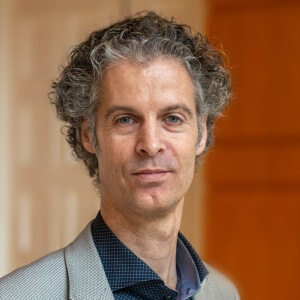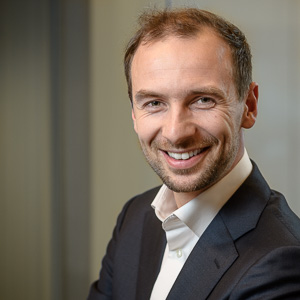
At just 24 years old, he has been hailed as the best student entrepreneur worldwide; his products are sold in seventy countries and he has just opened a new office in Boston.
Born in Haarlem, Steinar Henskes is the founder and director of the Bird Control Group, a company that uses intelligent laser technology to scare unwanted birds away from places such as airports, farms and factory sites.
Steinar Henskes has always been fascinated by laser technology. Until a few years ago, he ran a small company specialising in developing applications using laser light, including for the alignment of specific materials. One night, whilst tinkering with a laser lamp in a field, he noted that birds would simply fly off. ‘The cogs in my head began to turn’, says Steinar. ‘I saw an opportunity straight away and delved into literature to find out what had already been published on the subject. There are of course many places imaginable where birds are unwelcome. I realised that if it was possible to use a laser as a modern, animal-friendly bird scarer, I’d found a gap in the market.’
Bundled light particles
It was none other than Albert Einstein who established the foundations for laser light. Modern applications include pointers that are used during presentations and lasers to play CDs and even cut steel. Steinar explains: ‘Lasers consist of nothing more than a beam of light particles.’ ‘Birds see this as a threat to their comfort zone, so they are frightened by it. It is similar to the way in which people respond when they see a car approaching at great speed. Your whole body will tell you you’re in danger. We have developed a laser that is safe for humans and animals but that has a maximum impact on birds.’ And only a few years later, this idea has proved to be a winner.
Facing market scepticism
Steinar first developed a device suitable for the agricultural sector. This took a form similar to that of a torch, which farmers could use to scare birds away from a distance. ‘I then embarked on a search for partners such as production companies. In addition, I needed a network of distributors who could sell this manually operated laser for me. Only then did I realise how much effort it takes to bring an innovative product onto the market. People were somewhat sceptical at first. But through the use of short videos and product demonstrations I was able to prove that the concept really works. The fact that the product is easy to use and a little publicity did the rest.’
Airfields
A new standard in bird deterrents had been set. The Bird Control Group’s products quickly found their way to markets abroad. Besides this, other market sectors quickly began to take note too. According to Steinar, the leisure industry was next in line to jump on the bandwagon. ‘And then, before long, I was invited to a meeting at Schiphol. These discussions meant a significant boost for our company. Schiphol naturally wanted an automatic laser, a kind of robot that could keep a whole zone bird-free.’ Bird Control Group’s client portfolio now includes numerous airports around the world.
Intellectual property
The growth of Henskes’ company also resulted in an increased need to arrange proper protection with regard to their intellectual property. ‘I realised that we had a truly unique approach,’ Steinar enthuses. To have Bird Control Group’s technology and products set the standard in their market, is his ultimate goal. ‘We now have three patents on the technology and a number of registered brand names. They not only give us an advantage over our competitors, but more importantly, they provide ample opportunity to expand the company further.’ The commercial value offered by the trademarks and patents provide additional security, as a result of which three informal investors decided to join him. V.O. Patents & Trademarks is the regular advisor of the Bird Control Group.
Relevant for society
The Bird Control Group now sells laser solutions to approximately 70 countries around the world. The number of sectors that make use of them is also still growing, with the farming, aerospace, leisure and manufacturing industries serving as just a few examples. ‘But the fishing industry could benefit too. The by-catch of line fishing includes birds and no less than 300,000 of them are killed for this reason every year. We are therefore now also installing our lasers on boats. When it comes to commercial activities, birds are now kept at a distance. That’s another problem solved and society benefits yet again!’
Five innovation tips from Steinar Henskes, Bird Control Group
1. Your invention does not have to be completely new to be an innovation. Solving an existing problem with an existing product could result in a significant breakthrough.
2. Henry Ford once said: ‘If I had asked people what they wanted – they would have said faster horses.’ Don’t allow yourself to be put off by initial scepticism from the market. And always think big. Your market could be as big as the whole world.
3. Find the right partners. Tap into existing networks, for example where the distribution of your products is concerned. It could give your company a big push in the right direction.
4. Bring knowledge and experience into your company, so that you can continue to innovate and grow quickly. I personally did not obtain a degree from a technical university, but my staff now include graduate engineers. And my investors’ contribution to the company is not limited to funds either, they also bring knowledge and contacts with them.
5. Arrange your intellectual property, both for your product and your brand. This helps to create added value for your company and it works in your favour during discussions with financiers and investors. It is proof that you have a professional approach. Sure, your product is unique, but is it protected?
Johannes van Melle, partner at V.O. Patents & Trademarks
‘Innovation is all about strategic partnerships, growth, development and improvement. Businesses will look for financing so they can invest further. Are you, as a business, making the right choices? In each of those stages, it is important to have proper arrangements in place when it comes to your intellectual property. Established companies follow the same approach. They are well aware of how these things work. It is key for innovators to recognise these economic imperatives. It is what I would call patent reality. The solid economic basis provided by patents offers businesses the opportunity to progress to the next level.’

